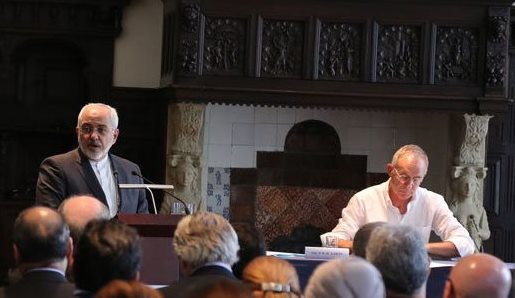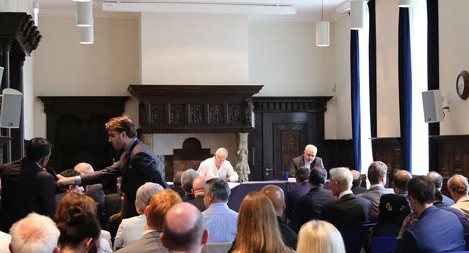Events
Trade and Globalisation
After meetings with the House of Representatives, Prime Minister Mark Rutte and his Dutch peer Bert Koenders, Iran’s Minister of Foreign Affairs, Mohammad Javad Zarif visited the Clingendael Institute to discuss the regional political situation of Iran (1). A short impression.
Non-zero-sum games
Minister Zarif condemns killing in the name of religion, and claimed that any foreign policy should look beyond force alone: ”one cannot kill extremism”. Similarly, with respect to domestic politics in the Netherlands: ”one cannot battle hatred by curtailing immigration”. In order to solve international issues, we must first define them in a non-zero-sum way (2). “Syria needs political rather than military solutions for peacebuilding”. Warning against the military strategy of deterrence, Minister Zarif explained that “after all, nuclear first strike capability means that you can demolish anyone. Second strike capability means that you can only demolish your attacker”.
Negotiating over an orange
Analogically, Minister Zarif asks us to imagine that a mother has one orange for her two children. Her daughter wants to make orange juice and her brother wants to bake an orange cake. From a distributive bargaining (zero-sum) perspective, they risk to end up with both getting half an orange. However, the daughter could also press the entire orange before giving the peel to her brother that he can then zest for his cake. This integrative (non-zero-sum) solution enables the brother to get 105% rather than 50%, as his sister even peels the orange for him. Negotiations trainers also use this famous orange anecdote to illustrate the distinction between negotiators’ positions (what: the orange) from their interests (why: their desired end product) (3). Similarly, Zarif emphasized that the West and Iran need to find common ground in peacebuilding efforts: “your security is our security”.
Joint Comprehensive Plan of Action (JCPOA)
The USA and Iran showed such a mindset the nuclear deal of summer 2015 that enabled Iran to re-enter the global market. More specifically, Iran, the P5+1 and the EU had agreed upon the Joint Comprehensive Plan of Action (JCPOA) in Vienna (4). The JCPOA has committed Iran to reduce its nuclear program in exchange for gradually lifting economic sanctions against Iran (5). Zarif: “the US Secretary of State, John Kerry, and I have gotten to know each other pretty well over the course of 400 days of negotiations. The JCPOA is a victory for everybody involved. Now it needs to be implemented".

At this Clingendael event, commentator Paul Aarts (6) recalls that Minister Zarif has stated that “the US needs to do way more”, while Central Bank of Iran (CBI) governor Valiollah Seif even has judged that “nothing has happened”. Iran’s Supreme Leader Ali Khamenei in his turn keeps claiming that “the Americans are engaged in obstruction and deception”. This makes Aarts wonder: “why such forceful language? Could it be that Iran is disappointed because the deal – in a mood of triumphalism – was sold domestically as delivering wholesale sanctions relief?”
Iran’s foreign policy and Syria
Referring to Iran’s military efforts in Syria to support the Assad regime, Aarts wonders how to explain what the commander of the Revolutionary Guards’ al-Quds Force, General Qassem Suleimani, has stated on Bahrain: “if the government of Bahrain continues oppressing its Shi’ite majority, the only outcome would be the destruction of this bloodthirsty regime”. Aarts: “this happened after the government had revoked the citizenship of Bahrain’s main Shi’ite spiritual leader, Sheikh Isa Qassim. The general seems to have fallen into the trap that was set for Iran by the al-Khalifa family in Bahrein, very likely in close collaboration with Saudi Arabia. For – as we may expect – these fierce statements by Suleimani will not sit well in Western capitals and can be used to undermine the rapprochement between Iran and the West. And, as some speculate, conservative forces within the Ministry of Foreign Affairs of Iran are unhappy with the Syria file. So how unified is Iran’s leadership about the Syria file and the fate of Syria’s President Bashar al-Assad?”.

Diverse views
In response Minister Zarif stressed that Iran is not as indivisible or unchangeable as it is often portrayed: “the diversity of views in pluralist societies such as the UK and the USA does not surprise anyone – not even the varying views among Tories on, for instance, the Brexit issue. Well, Iran is not a monolith either: we have different vocabularies within Iran as well. Still, there is a broad consensus among Iranian officials that the problems in Syria need to be addressed by political rather than military means – including General Qassem Soleimani, with whom I have regular conversations. However, the Kingdom of Saudi Arabia tends to insist on preconditions before negotiating. In fact, they are preparing for war. Foreigners should facilitate, not dictate any solutions. Rest assured, Iran will not come to solve your problems. We focus on our own region first.”
_______________________________________________
(1) Dr. Zarif is also a visiting lecturer in international relations at University of Tehran. An experienced diplomat, he has served as the ambassador at the Iranian mission to the United Nations (UN) in New York between 2002 and 2007.
(2) Non-zero sum games entail integrative (‘win-win’) rather than distributive (‘win-lose’) bargaining.
(3) If you are interested in enhancing your negotiation skills, check the course portfolio of Clingendael Academy, such as the Seminar International Negotiations (SIN).
(4) The P5+1 consists of the 5 permanent members of the UN Security Council and Germany.
(5) Michael R. Gordon and David E. Sanger, Deal Reached on Iran Nuclear Program; Limits on Fuel Would Lessen With Time, New York Times, 14-07-2015,
(6) Paul Aarts is a former senior lecturer in International Relations at the Unversity of Amsterdam. He reckons Iran more democratic than often portrayed (lecture in Dutch).
Photos by: Mehr News Agency: Minister Zarif adresses Clingendael Institute in the Netherlands / 24-06-2016.


